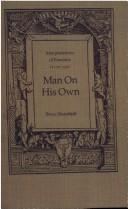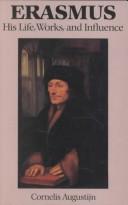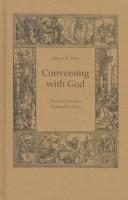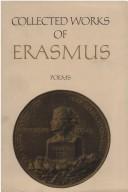| Listing 1 - 10 of 19 | << page >> |
Sort by
|
Book
ISBN: 9789004255623 9004255621 900425563X 1299829775 9789004255630 9781299829770 Year: 2013 Volume: 30 Publisher: Boston : Brill,
Abstract | Keywords | Export | Availability | Bookmark
 Loading...
Loading...Choose an application
- Reference Manager
- EndNote
- RefWorks (Direct export to RefWorks)
Erasmus was not only one of the most widely read authors of the early modern period, but one of the most controversial. For some readers he represented the perfect humanist scholar; for others, he was an arrogant hypercritic, a Lutheran heretic and polemicist, a virtuoso writer and rhetorician, an inventor of a new, authentic Latin style, et cetera In the present volume, a number of aspects of Erasmus’s manifold reception are discussed, especially lesser-known ones, such as his reception in Neo-Latin poetry. The volume does not focus only on so-called Erasmians, but offers a broader spectrum of reception and demonstrates that Erasmus’s name also was used in order to authorize completely un-Erasmian ideals, such as atheism, radical reformation, Lutheranism, religious intolerance, Jesuit education, Marian devotion, et cetera Contributors include: Philip Ford, Dirk Sacré, Paul J. Smith, Lucia Felici, Gregory D. Dodds, Hilmar M. Pabel, Reinier Leushuis, Jeanine De Landtsheer, Johannes Trapman, and Karl Enenkel.
Erasmus, Desiderius, --- Comparative literature --- Erasmus, Desiderius --- Appreciation. --- Érasme --- Desiderius Erasmus --- Erasm, Dezideriĭ --- Erasme, Désiré --- Erasmo, --- Erasmo, Desidério --- Erasmus, --- Ėrazm, --- Erazm, --- Roterodamus, Erasmus --- Rotterdamskiĭ, Ėrazm --- Rotterdamský, Erasmus Desiderius --- Роттердамский, Эразм --- Эразм, --- Ерасм, Дезидерий --- Erasmus Roterodamus, Desiderius --- Philosophy and civilization --- Religion and culture --- Erasmus --- Civilisation --- Religion et culture --- Philosophie --- エラスムス, デシデリウス --- Érasme, --- Erasmus, Desiderius, - -1536 --- Desiderius Erasmus, --- Erasm, Dezideriĭ, --- Erasme, Désiré, --- Erasmo, Desidério, --- Roterodamus, Erasmus, --- Rotterdamskiĭ, Ėrazm, --- Rotterdamský, Erasmus Desiderius, --- Роттердамский, Эразм, --- Ерасм, Дезидерий, --- אראסמוס, דסידריוס,
Book
ISBN: 3781555429 3781521362 Year: 2017 Publisher: Bad Heilbrunn Verlag Julius Klinkhardt
Abstract | Keywords | Export | Availability | Bookmark
 Loading...
Loading...Choose an application
- Reference Manager
- EndNote
- RefWorks (Direct export to RefWorks)
In der vorliegenden historischen Studie wird erstmals das in der Frühen Neuzeit allgegenwärtige Erziehungsideal der Frömmigkeit systematisch erschlossen und im Kontext von Theologie, Anthropologie und Affektenlehre verortet. Im Kontext der Affekttheorien gewinnt der Frömmigkeitsbegriff an Tiefe und wird für pädagogische Fragestellungen fruchtbar gemacht. Zugleich finden die Affekttheorien des 16. Jahrhunderts in der theologischer Anthropologie ihren legitimen Ort. Der Autor analysiert, auf welchen Grundlagen die Erziehung der Affekte im christlich-konfessionellen Kontext des 16. Jahrhunderts beruhte. Das Emanzipationspotential wird dabei ebenso sichtbar wie immanenter (Selbst-)Optimierungs- und Anpassungsdruck. Untersucht werden zwei der wichtigsten Protagonisten der Pädagogik des 16. Jahrhunderts: Erasmus von Rotterdam und Philipp Melanchthon. Damit wird zugleich die konfessionelle Ausdifferenzierung der Frömmigkeitspädagogik und der Affektregulierung in den Blick genommen. Hier fördert die Untersuchung entscheidende, in der jeweiligen Anthropologie begründete Unterschiede zu Tage. Die Arbeit erschließt die Grundlagen für eine Frömmigkeitsforschung aus pädagogischer Perspektive. Frömmigkeit erscheint dabei als ein vielschichtiger Begriff mit großem Potential zum Verständnis der Pädagogik des 16. und 17. Jahrhunderts.
Erasmus von Rotterdam --- Philipp Melanchthon --- Erziehungsideal --- Frömmigkeit --- Affekt --- Erasmus, Desiderius, --- Melanchton, Philipp, --- Erasmus, Desiderius --- Erasmus Roterodamus, Desiderius --- Erasmus --- Érasme --- Desiderius Erasmus --- Erasm, Dezideriĭ --- Erasme, Désiré --- Erasmo, --- Erasmo, Desidério --- Erasmus, --- Ėrazm, --- Erazm, --- Roterodamus, Erasmus --- Rotterdamskiĭ, Ėrazm --- Rotterdamský, Erasmus Desiderius --- Desiderius Erasmus, --- Erasm, Dezideriĭ, --- Erasme, Désiré, --- Erasmo, Desidério, --- Roterodamus, Erasmus, --- Rotterdamskiĭ, Ėrazm, --- Rotterdamský, Erasmus Desiderius, --- Роттердамский, Эразм, --- Эразм, --- Ерасм, Дезидерий, --- אראסמוס, דסידריוס, --- Роттердамский, Эразм --- Ерасм, Дезидерий --- エラスムス, デシデリウス
Book
ISBN: 9780802099051 080209905X 9781442687998 9781442693173 1442687991 9781487525101 1442693177 Year: 2009 Volume: *17 Publisher: Toronto, [Ontario] ; Buffalo, [New York] ; London, [England] : University of Toronto Press,
Abstract | Keywords | Export | Availability | Bookmark
 Loading...
Loading...Choose an application
- Reference Manager
- EndNote
- RefWorks (Direct export to RefWorks)
An engaging look at Erasmus' theological, philosophical and socio-political influence, Encounters with a Radical Erasmus will prove useful to scholars of humanism, theology, the Reformation and Renaissance.
Erasmus, Desiderius --- Radicalism --- Authors and readers --- History --- Erasmus, Desiderius, --- Influence. --- Criticism and interpretation --- History. --- Radicalisme --- Relations écrivains-lecteurs --- Érasme --- Critique et interprétation. --- Readers and authors --- Authorship --- Extremism, Political --- Ideological extremism --- Political extremism --- Political science --- Desiderius Erasmus, --- Erasm, Dezideriĭ, --- Erasme, Désiré, --- Erasmo, --- Erasmo, Desidério, --- Erasmus, --- Ėrazm, --- Erazm, --- Roterodamus, Erasmus, --- Rotterdamskiĭ, Ėrazm, --- Rotterdamský, Erasmus Desiderius, --- Роттердамский, Эразм, --- Эразм, --- Ерасм, Дезидерий, --- אראסמוס, דסידריוס, --- E-books --- Erasmus --- Desiderius Erasmus --- Erasm, Dezideriĭ --- Erasme, Désiré --- Erasmo, Desidério --- Roterodamus, Erasmus --- Rotterdamskiĭ, Ėrazm --- Rotterdamský, Erasmus Desiderius --- Роттердамский, Эразм --- Ерасм, Дезидерий --- Erasmus Roterodamus, Desiderius --- エラスムス, デシデリウス --- Europe. --- Council of Europe countries --- Eastern Hemisphere --- Eurasia

ISBN: 0802059503 9786612039874 1282039873 1442676957 9780802059505 9781442676954 Year: 1992 Volume: 11 Publisher: Toronto, Ont. University of Toronto Press
Abstract | Keywords | Export | Availability | Bookmark
 Loading...
Loading...Choose an application
- Reference Manager
- EndNote
- RefWorks (Direct export to RefWorks)
During his lifetime Erasmus was one of the most controversial figures of Renaissance and Reformation Europe. In the 450 years since his death his reputation has undergone a series of fluctuations that reflect the attitudes of successive periods in European, and eventually North American, theological and social thought.Mansfield aims to relate changing interpretations of Erasmus to the historical contexts and experiences of those who wrote about him. He explores the influences in turn of the Enlightenment, romanticism, religious revival, and the emergence of liberalism.In the twentieth century, Mansfield concludes, more modern ways of studying Erasmus have emerged, notably through seeing him more precisely in his own historical context. He argues, nevertheless, that the Enlightenment liberal interpretation of Erasmus remained the dominant one through the whole period, and that despite its weaknesses, it did succeed in revealing essential aspects of Erasmus as a historical personality.
History of philosophy --- Erasmus, Desiderius --- Humanists --- Erasmus, Desiderius, --- Érasme --- Desiderius Erasmus --- Erasm, Dezideriĭ --- Erasme, Désiré --- Erasmo, --- Erasmo, Desidério --- Erasmus, --- Ėrazm, --- Erazm, --- Roterodamus, Erasmus --- Rotterdamskiĭ, Ėrazm --- Rotterdamský, Erasmus Desiderius --- Роттердамский, Эразм --- Эразм, --- Ерасм, Дезидерий --- Criticism and interpretation --- History. --- Netherlands --- Intellectual life --- Scholars --- 873.4 ERASMUS ROTERODAMUS, DESIDERIUS --- 873.4 ERASMUS ROTERODAMUS, DESIDERIUS Humanistisch Latijnse literatuur--ERASMUS ROTERODAMUS, DESIDERIUS --- Humanistisch Latijnse literatuur--ERASMUS ROTERODAMUS, DESIDERIUS --- Erasmus Roterodamus, Desiderius --- Erasmus --- History --- Humanistes --- エラスムス, デシデリウス --- Humanists - Netherlands. --- Desiderius Erasmus, --- Erasm, Dezideriĭ, --- Erasme, Désiré, --- Erasmo, Desidério, --- Roterodamus, Erasmus, --- Rotterdamskiĭ, Ėrazm, --- Rotterdamský, Erasmus Desiderius, --- Роттердамский, Эразм, --- Ерасм, Дезидерий, --- אראסמוס, דסידריוס,

ISBN: 0802071775 9780802071774 9786612045370 1282045377 1442674571 9781442674578 0802058647 9780802058645 1442654333 9781282045378 9781442654334 Year: 1991 Publisher: Toronto Buffalo University of Toronto Press
Abstract | Keywords | Export | Availability | Bookmark
 Loading...
Loading...Choose an application
- Reference Manager
- EndNote
- RefWorks (Direct export to RefWorks)
Erasmus: His Life, Works, and Influence is a comprehensive introduction to Erasmus's life, works, and thoughts. It integrates the best scholarship of the past twenty years and will appeal to undergraduates in all areas of cultural history as well as Erasmus specialists.
Authors, Latin (Medieval and modern) --- Humanists --- Scholars, Medieval --- Medieval scholars --- Erasmus, Desiderius, --- Erasmus, Desiderius --- Érasme --- Desiderius Erasmus --- Erasm, Dezideriĭ --- Erasme, Désiré --- Erasmo, --- Erasmo, Desidério --- Erasmus, --- Ėrazm, --- Erazm, --- Roterodamus, Erasmus --- Rotterdamskiĭ, Ėrazm --- Rotterdamský, Erasmus Desiderius --- Роттердамский, Эразм --- Эразм, --- Ерасм, Дезидерий --- Criticism and interpretation. --- Netherlands --- Intellectual life --- Erasmus, Desiderius. --- Érasme, --- Critique et interpretation. --- Erasmus Roterodamus, Desiderius --- Erasmus --- Desiderius Erasmus, --- Erasm, Dezideriĭ, --- Erasme, Désiré, --- Erasmo, Desidério, --- Roterodamus, Erasmus, --- Rotterdamskiĭ, Ėrazm, --- Rotterdamský, Erasmus Desiderius, --- Роттердамский, Эразм, --- Ерасм, Дезидерий, --- אראסמוס, דסידריוס, --- エラスムス, デシデリウス --- Érasme (1469-1536) --- Critique et interprétation --- Biographie --- Influence
Book
ISBN: 9781487500610 1487500610 1487500610 9781487511456 1487511450 1487511469 Year: 2017 Volume: *23 Publisher: Toronto : University of Toronto Press,
Abstract | Keywords | Export | Availability | Bookmark
 Loading...
Loading...Choose an application
- Reference Manager
- EndNote
- RefWorks (Direct export to RefWorks)
"This study focuses on Erasmus' two-dimensional grasp of Stoicism evident in his edition of De officiis (1501) and the huge implications he saw for religion. The author argues that "The Philosophy of Christ' for which Erasmus is famous is a Christian version of Stoicism."--
Stoics. --- Stoïcisme. --- Erasmus, Desiderius, --- Érasme --- Jesus Christ. --- Jésus-Christ. --- Criticism and interpretation. --- Critique et interprétation. --- Christology --- Erasmus, Desiderius --- Stoics --- Stoïcisme --- Erasmus, Desiderius - -1536 --- Jésus-Christ --- Jesus Christ --- Erasmus Roterodamus, Desiderius --- Erasmus --- Desiderius Erasmus --- Erasm, Dezideriĭ --- Erasme, Désiré --- Erasmo, --- Erasmo, Desidério --- Erasmus, --- Ėrazm, --- Erazm, --- Roterodamus, Erasmus --- Rotterdamskiĭ, Ėrazm --- Rotterdamský, Erasmus Desiderius --- Роттердамский, Эразм --- Эразм, --- Ерасм, Дезидерий --- エラスムス, デシデリウス --- Desiderius Erasmus, --- Erasm, Dezideriĭ, --- Erasme, Désiré, --- Erasmo, Desidério, --- Roterodamus, Erasmus, --- Rotterdamskiĭ, Ėrazm, --- Rotterdamský, Erasmus Desiderius, --- Роттердамский, Эразм, --- Ерасм, Дезидерий, --- אראסמוס, דסידריוס,
Book
ISBN: 1108266304 1108270859 1108271766 1108273580 1108277241 1108264948 1108274498 1108417140 1108404634 9781108277242 9781108264945 9781108404631 9781108417143 9781108404631 Year: 2017 Publisher: Cambridge : Cambridge University Press,
Abstract | Keywords | Export | Availability | Bookmark
 Loading...
Loading...Choose an application
- Reference Manager
- EndNote
- RefWorks (Direct export to RefWorks)
This book offers the first comprehensive account and re-appraisal of the formative phase of what is often termed the 'Grotian tradition' in international relations theory: the view that sovereign states are not free to act at will, but are akin to members of a society, bound by its norms. It examines the period from the later fifteenth to the mid-seventeenth centuries, focusing on four thinkers: Erasmus, Vitoria, Gentili and Grotius himself, and is structured by the author's concept of international society. Erasmus' views on international relations have been entirely neglected, but underlying his work is a consistent image of international society. The theologian Francisco de Vitoria concerns himself with its normative principles, the lawyer Alberico Gentili - unexpectedly, the central figure in the narrative - with its extensive practical applications. Grotius, however, does not re-affirm the concept, but wavers at crucial points. This book suggests that the Grotian tradition is a misnomer.
International relations --- Philosophy. --- Erasmus, Desiderius, --- Vitoria, Francisco de, --- Gentili, Alberico, --- Grotius, Hugo, --- De Groot, Huig --- De Groot, Huigh --- Grotius, Hugo --- Groot, Hugo de, --- Grozio, Ugo, --- Grot︠s︡iĭ, Gugo, --- De Groot, Hugo, --- Grocio, Hugo, --- Gentilis, Albericus, --- Francisco de Vitoria, --- Victoria, Francisco de, --- Francisco, --- Franziscus, --- Franzisco, --- Franciscus, --- De Vitoria, Francisco, --- Vittoria, Francisco de, --- Erasmus --- Erasmus, Desiderius --- Érasme --- Desiderius Erasmus --- Erasm, Dezideriĭ --- Erasme, Désiré --- Erasmo, --- Erasmo, Desidério --- Erasmus, --- Ėrazm, --- Erazm, --- Roterodamus, Erasmus --- Rotterdamskiĭ, Ėrazm --- Rotterdamský, Erasmus Desiderius --- Роттердамский, Эразм --- Эразм, --- Ерасм, Дезидерий --- Erasmus Roterodamus, Desiderius --- エラスムス, デシデリウス --- Desiderius Erasmus, --- Erasm, Dezideriĭ, --- Erasme, Désiré, --- Erasmo, Desidério, --- Roterodamus, Erasmus, --- Rotterdamskiĭ, Ėrazm, --- Rotterdamský, Erasmus Desiderius, --- Роттердамский, Эразм, --- Ерасм, Дезидерий, --- אראסמוס, דסידריוס,

ISSN: 03183319 ISBN: 9780802041012 0802041019 9786612029387 128202938X 144267346X 9781442673465 Year: 1997 Volume: 13 Publisher: Toronto, Ont. University of Toronto Press
Abstract | Keywords | Export | Availability | Bookmark
 Loading...
Loading...Choose an application
- Reference Manager
- EndNote
- RefWorks (Direct export to RefWorks)
Conversing with God opens up for scholarly attention a much neglected aspect of Erasmus' philosophia Christi, building a lucid and cogent argument for the important theological aspect of Erasmus' prayers, which has often been discounted or denied by more traditional scholarship. Underlying this analysis is a principle both rhetorical and pastoral: accommodation. Pabel explains that in teaching his contemporaries how to accommodate their prayer to God, Erasmus engaged in a 'literary cure of souls, ' or a pastoral ministry executed through the printing press. In Conversing with God Hilmar M. Pabel examines Erasmus' understanding of prayer and how he taught western Christendom to pray in the Reformation era of the sixteenth century. To this end, Pabel adopts Erasmus' own rhetorical analysis of prayer, understood as a colloquy or conversation with God, and considers: Who is God, the audience of prayer? What sort of person should one be in order to pray? What is the proper object of prayer? With which words should one pray?
873.4 ERASMUS ROTERODAMUS, DESIDERIUS:2 --- 873.4 ERASMUS ROTERODAMUS, DESIDERIUS:2 Humanistisch Latijnse literatuur-:-Godsdienst. Theologie--ERASMUS ROTERODAMUS, DESIDERIUS --- Humanistisch Latijnse literatuur-:-Godsdienst. Theologie--ERASMUS ROTERODAMUS, DESIDERIUS --- Contributions in the understanding of prayer. --- Prayer --- Christianity --- History --- Erasmus, Desiderius, --- Erasmus, Desiderius --- Érasme --- Desiderius Erasmus --- Erasm, Dezideriĭ --- Erasme, Désiré --- Erasmo, --- Erasmo, Desidério --- Erasmus, --- Ėrazm, --- Erazm, --- Roterodamus, Erasmus --- Rotterdamskiĭ, Ėrazm --- Rotterdamský, Erasmus Desiderius --- Роттердамский, Эразм --- Эразм, --- Ерасм, Дезидерий --- Worship --- Prayers --- Erasmus Roterodamus, Desiderius --- Erasmus --- Erasme. (Collection) --- Erasmus. (Reeks) --- エラスムス, デシデリウス --- Prayer - Christianity - History - 16th century --- Erasmus, Desiderius, - d. 1536 --- Desiderius Erasmus, --- Erasm, Dezideriĭ, --- Erasme, Désiré, --- Erasmo, Desidério, --- Roterodamus, Erasmus, --- Rotterdamskiĭ, Ėrazm, --- Rotterdamský, Erasmus Desiderius, --- Роттердамский, Эразм, --- Ерасм, Дезидерий, --- אראסמוס, דסידריוס, --- Érasme (1469-1536) --- Prière --- Critique et interprétation --- Catéchèse --- 16e siècle

ISBN: 0802028675 148752076X 1442678569 9781442678569 9780802028679 1487512414 9781487520762 Year: 1993 Volume: 85-86 Publisher: Toronto : University of Toronto Press,
Abstract | Keywords | Export | Availability | Bookmark
 Loading...
Loading...Choose an application
- Reference Manager
- EndNote
- RefWorks (Direct export to RefWorks)
The final two volumes in the CWE contain an edition and translation of Erasmus's poetry. For Erasmus scholars this work affords the first opportunity to evaluate and analyse Erasmus' poems in English. And for those interested in Renaissance and Reformation poetry in general, these offer an intriguing look at the work of one of the towering figures of the period writing in a genre that was, for him, unusual.The annotations include a path-breaking commentary piece by Harry Vredeveld on Erasmus' most famous poem, `Poem on the Trouble of Old Age.' Another important feature is the appearance of the original Latin of each poem alongside the English translation.
Neo-Latin literature --- Latin poetry, Medieval and modern --- -Latin literature, Medieval and modern --- Translations into English --- Erasmus, Desiderius --- -Translations into English --- Latin poetry. --- Erasmus, Desiderius, --- Érasme --- Desiderius Erasmus --- Erasm, Dezideriĭ --- Erasme, Désiré --- Erasmo, --- Erasmo, Desidério --- Erasmus, --- Ėrazm, --- Erazm, --- Roterodamus, Erasmus --- Rotterdamskiĭ, Ėrazm --- Rotterdamský, Erasmus Desiderius --- Роттердамский, Эразм --- Эразм, --- Ерасм, Дезидерий --- Translations into English. --- Latin literature --- Erasmus Roterodamus, Desiderius --- Erasmus --- エラスムス, デシデリウス --- 873.4 ERASMUS ROTERODAMUS, DESIDERIUS --- 873.4 ERASMUS ROTERODAMUS, DESIDERIUS Humanistisch Latijnse literatuur--ERASMUS ROTERODAMUS, DESIDERIUS --- Humanistisch Latijnse literatuur--ERASMUS ROTERODAMUS, DESIDERIUS --- Erasmus, Desiderius, - -1536 - Translations into English --- Authors, Latin (Medieval and modern) --- Auteurs latins --- Vie intellectuelle --- Humanists --- Humanistes --- Traductions anglaises. --- Sources. --- Érasme, --- Netherlands --- Intellectual life --- Desiderius Erasmus, --- Erasm, Dezideriĭ, --- Erasme, Désiré, --- Erasmo, Desidério, --- Roterodamus, Erasmus, --- Rotterdamskiĭ, Ėrazm, --- Rotterdamský, Erasmus Desiderius, --- Роттердамский, Эразм, --- Ерасм, Дезидерий, --- אראסמוס, דסידריוס, --- Erasmus, Desiderius, - -1536 --- Érasme,
Book
ISBN: 9781487516185 1487516185 9780802038760 080203876X Year: 2018 Publisher: Toronto Buffalo London
Abstract | Keywords | Export | Availability | Bookmark
 Loading...
Loading...Choose an application
- Reference Manager
- EndNote
- RefWorks (Direct export to RefWorks)
"Part 1 tells the story of the formation, growth, scope, and disposal of Erasmus' library with an analysis of his relationship in his books. Part 2 is an annotated catalogue of all the items known to have been contained in Erasmus' library."--
Erasmus, Desiderius, - -1536 --- Erasmus, Desiderius, --- Érasme --- Library. --- Bibliothèque. --- Library --- Books and reading. --- Livres et lecture. --- Libraries. --- HISTORY --- PHILOSOPHY --- Appraisal of books --- Books --- Choice of books --- Evaluation of literature --- Literature --- Reading and books --- Reading, Choice of --- Reading habits --- Reading public --- Reading --- Reading interests --- Reading promotion --- Documentation --- Public institutions --- Librarians --- Modern --- History & Surveys --- Modern. --- Appraisal --- Evaluation --- Erasmus, Desiderius --- Erasmus Roterodamus, Desiderius --- Erasmus --- Desiderius Erasmus --- Erasm, Dezideriĭ --- Erasme, Désiré --- Erasmo, --- Erasmo, Desidério --- Erasmus, --- Ėrazm, --- Erazm, --- Roterodamus, Erasmus --- Rotterdamskiĭ, Ėrazm --- Rotterdamský, Erasmus Desiderius --- Desiderius Erasmus, --- Erasm, Dezideriĭ, --- Erasme, Désiré, --- Erasmo, Desidério, --- Roterodamus, Erasmus, --- Rotterdamskiĭ, Ėrazm, --- Rotterdamský, Erasmus Desiderius, --- Роттердамский, Эразм, --- Эразм, --- Ерасм, Дезидерий, --- אראסמוס, דסידריוס, --- Роттердамский, Эразм --- Ерасм, Дезидерий --- エラスムス, デシデリウス --- Gulik, Egbertus van, --- Book history --- bookstocks
| Listing 1 - 10 of 19 | << page >> |
Sort by
|

 Search
Search Feedback
Feedback About
About Help
Help News
News